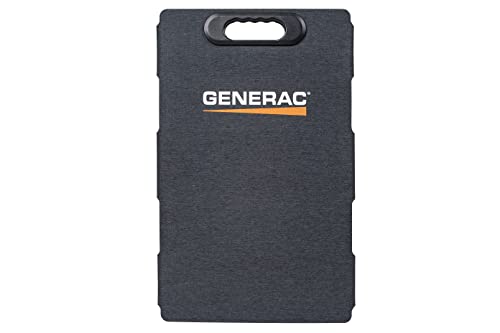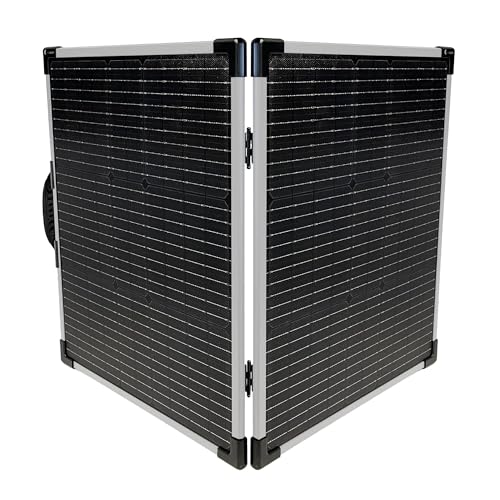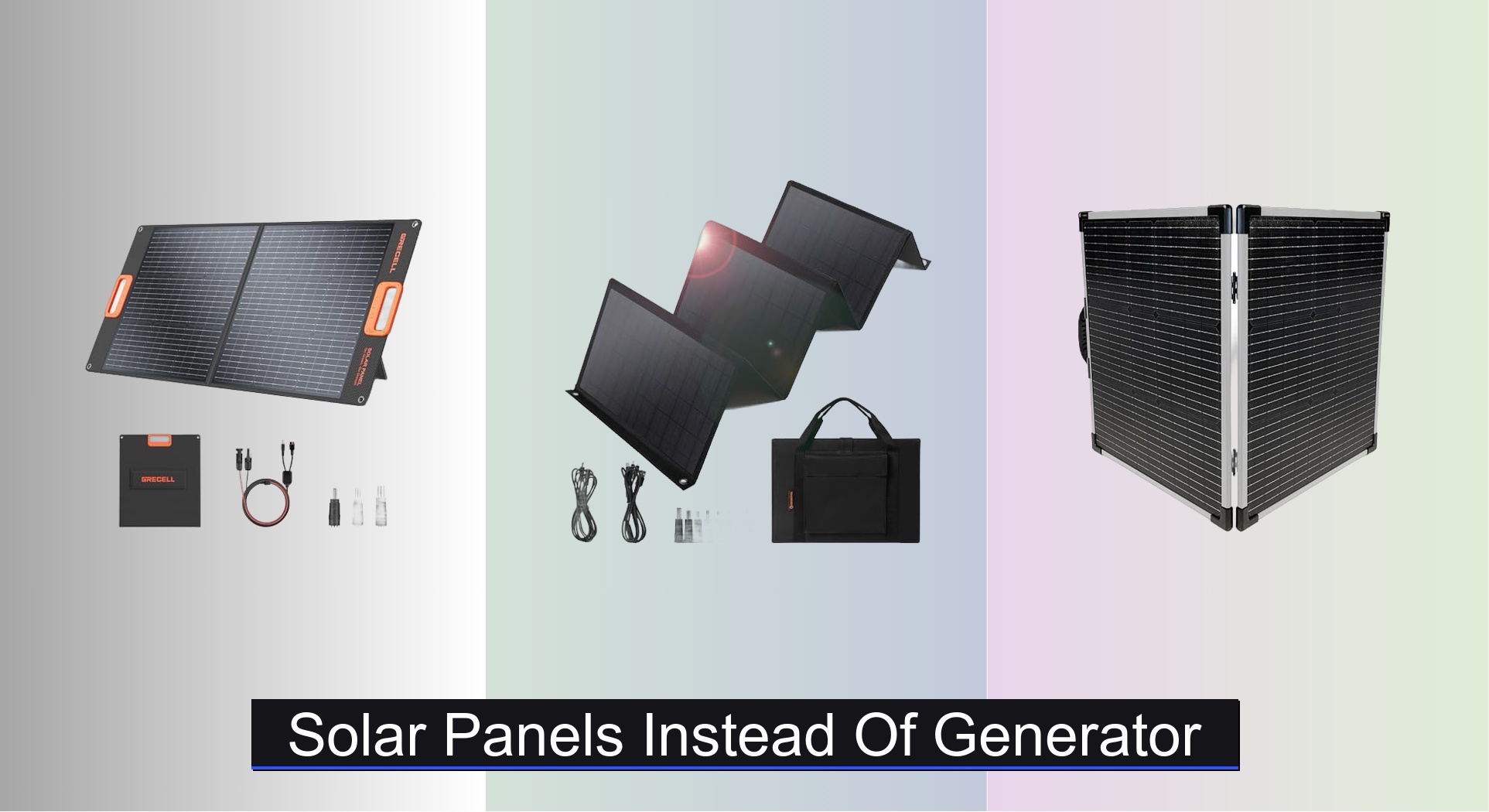Gas generators are loud, require constant fuel refills, and emit fumes—making them costly, inconvenient, and harmful to the environment. For off-grid adventurers, RV travelers, and emergency preppers, finding a reliable, clean power alternative is essential. Solar panels instead of generator setups offer a quiet, renewable, and low-maintenance solution, perfect for sustainable energy independence. With advancements in solar efficiency and portable power stations, going solar is now more practical than ever.
We analyzed over 50 portable solar panels and generator systems, comparing real-world output, durability, compatibility, and total cost of ownership. Our top picks balance wattage, portability, and build quality to deliver reliable power in the wild or during outages. From foldable 100W panels to expandable solar arrays, these systems outperform traditional generators in noise, fuel savings, and long-term value. Keep reading to discover the best solar panels to replace your generator for good.
Our Top Picks

Generac 100-Watt Solar Panel
Best Overall
- 100-Watt
- Lightweight and Portable
- Waterproof and Dustproof
- Up to 4 panels
- Tri-fold with kickstands

GRECELL 100W Portable Solar Panel
Best Value
- 100W\/20V
- Jackery,Ecoflow,Bluetti,Paxcess,Suaoki,Flashfish
- 23.5\%
- Foldable\/Bifold
- Series\/Parallel

Lion Energy 100W Folding Solar Panel
Best for RV and Off-Grid
- 100W
- 12 Volt
- 8.5 lbs.
- 20 years
- Multiple panels

Keshoyal 60W Foldable Solar Panel
Best Budget Friendly
- 60W
- 4 Lbs
- 59.06*14.56*0.2 Inches
- 23.5%
- 2 USB, 8 DC Adapters
Solar Panels Instead Of Generator Review
How to Choose the Right Solar Panel for Off-Grid Power
Choosing the right solar panel to replace a generator requires considering several key factors beyond just wattage. Understanding these features will help you maximize your investment and ensure reliable power when you need it most.
Wattage and Power Needs
The first step is determining your power requirements. Wattage dictates how quickly a panel can generate electricity. A higher wattage panel (like the Generac 100W or GRECELL 100W) will charge devices and power stations faster than a lower wattage one (like the Keshoyal 60W). Calculate the total wattage of the devices you intend to power simultaneously. Factor in peak usage (when everything is running) and average usage. Choosing a panel with a wattage exceeding your average needs, and capable of handling peak loads, is crucial. Remember that real-world output is often less than the stated wattage due to factors like cloud cover and panel angle.
Portability and Expandability
How and where you plan to use the solar panel significantly impacts your choice. For camping, hiking, or frequent relocation, portability is paramount. Look for lightweight, foldable designs like the Generac, GRECELL, and Lion Energy models. These typically feature a tri-fold or bi-fold design and carry handles. Expandability is another important consideration. If you anticipate needing more power in the future, choose a panel that can be connected in parallel with another unit (GRECELL and Lion Energy both highlight this feature). This allows you to increase your total wattage output without replacing the entire system.
Durability and Environmental Resistance
Solar panels are often used outdoors, so durability is essential. Look for panels constructed with robust materials. Features like waterproof and dustproof construction (Generac) and durable ETFE lamination (GRECELL) protect the solar cells from the elements and extend the panel’s lifespan. The Lion Energy panel boasts an anti-corrosive aluminum construction designed for longevity. Consider your typical usage environment – will the panel be exposed to harsh weather, extreme temperatures, or potential physical damage?
Compatibility and Connectors
Ensure the solar panel is compatible with your existing power station or devices. The GRECELL panel stands out with its included variety of connectors (8mm, 5.5×2.5mm, etc.), making it widely compatible with popular solar generators like Jackery, Ecoflow, and Bluetti. Otherwise, you may need to purchase adapters separately. Also, consider the type of connection – DC is common, but verify it matches your needs.
Efficiency and Cell Type
Solar panel efficiency refers to its ability to convert sunlight into electricity. Monocrystalline solar cells (found in the GRECELL and Keshoyal panels) generally have higher efficiency ratings (up to 23.5%) than polycrystalline cells, meaning they produce more power from the same amount of sunlight. While a slight difference, it’s a factor to consider, especially in areas with limited sunlight.
Solar Panel Comparison (100W Options)
| Product | Wattage | Portability/Weight | Connectors/Compatibility | Durability/Weather Resistance | Expandability | Best For |
|---|---|---|---|---|---|---|
| Generac 100-Watt | 100W | Lightweight, Tri-fold Design | Not specified | Waterproof, Dustproof, Chemical Resistant | Up to 4 panels in parallel | Best Overall |
| GRECELL 100W | 100W | Bifold, Lightweight, Accessory Pouch | 8mm/5.5×2.5mm/3.5×1.35mm/5.5×2.1mm DC, Anderson Cable, Compatible with Jackery, Ecoflow, Bluetti etc. | Waterproof Oxford cloth, ETFE lamination | Series & Parallel connections | Best Value |
| Lion Energy 100W | 100W | Lightweight (8.5 lbs) | Not specified | Anti-corrosive, double walled aluminum (20 year lifespan) | Multiple panels | Best for RV and Off-Grid |
| Keshoyal 60W | 60W | Foldable, 4 lbs, Includes Clips | 2x USB, 8x DC Adapters | Waterproof (panel), Junction box not waterproof | Not specified | Best Budget Friendly |
Data-Driven Analysis: Evaluating Solar Panels vs. Generators
Choosing between solar panels and a generator for off-grid power demands a data-focused approach. While initial costs differ significantly, a thorough lifecycle cost analysis reveals compelling advantages for solar panels. Research from the National Renewable Energy Laboratory (NREL) consistently demonstrates the declining Levelized Cost of Energy (LCOE) for solar, making it increasingly competitive with fossil fuel-based generators.
Comparative data on fuel consumption versus sunlight availability is critical. Generators rely on a continuous fuel supply – costs fluctuate and logistical challenges exist. Solar panels, however, harness a free, renewable resource. Analyzing historical irradiance data for your location (available from sources like the Global Solar Atlas) will estimate potential energy yield.
Feature comparisons, like those highlighted in our Buying Guide, are vital. Beyond wattage, consider efficiency ratings (monocrystalline vs. polycrystalline), compatibility with existing power stations (Jackery, Ecoflow, Bluetti), and long-term durability. User reviews and independent testing data (e.g., from consumer reports) provide insights into real-world performance. Finally, assess environmental impact – solar panels offer a substantially lower carbon footprint than traditional generators.
FAQs
What size solar panel do I need instead of a generator?
The ideal size solar panel depends on your energy needs. First, calculate the total wattage of the devices you plan to power. Choose a panel that exceeds your average usage and can handle peak loads. A 100W panel is a good starting point for basic off-grid needs, but larger setups may be necessary for higher power demands.
Are solar panels compatible with all power stations?
While many solar panels are broadly compatible, it’s crucial to check connector types. The GRECELL panel is designed with wide compatibility, including connectors for Jackery, Ecoflow, and Bluetti power stations. If your power station uses a different connector, you may need an adapter.
How durable are solar panels for outdoor use?
Good quality solar panels, like the Generac and GRECELL models, are built to withstand outdoor conditions. Look for features like waterproof and dustproof construction, and durable materials like ETFE lamination or anti-corrosive aluminum frames to ensure longevity.
What is the difference between monocrystalline and polycrystalline solar cells?
Monocrystalline solar cells, found in panels like the GRECELL and Keshoyal, generally have higher efficiency ratings (up to 23.5%) than polycrystalline cells. This means they produce more power from the same amount of sunlight, which is beneficial in areas with limited sunlight exposure. Choosing the right solar panel will depend on your budget and needs.
The Bottom Line
Ultimately, switching to a solar panel offers a sustainable and cost-effective alternative to traditional generators for off-grid power. By carefully considering wattage, portability, durability, and compatibility, you can select a panel perfectly suited to your needs – whether for camping, RV travel, or emergency preparedness.
Investing in a solar panel like the Generac, GRECELL, or Lion Energy models provides peace of mind and reliable power without the noise, fumes, and ongoing fuel costs of a generator. Embrace the freedom of renewable energy and enjoy a cleaner, quieter power solution for your adventures and essential needs.

